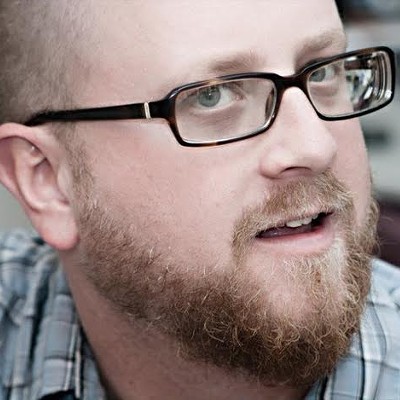When he's touring in Europe, Gabriel Sullivan keeps an eye out for Gypsies with instruments.
"It's a constant search for that common theme of necessity in the music," says Sullivan, whose band, Taraf de Tucson, sets Balkan brass and Peruvian cumbia side by side, combining Latin rhythms and exotic melodies into a dazzling, energetic, and fearless new blend. "The music of poor people has always been the most powerful for me, people singing about real struggle, real pain. It's nothing glamorous, nothing polished, and it hurts a bit."
Taraf de Tucson began about two years ago, after Sullivan moved into a rehearsal space that was surrounded by flamenco guitarist, folk singer, and painter Salvador Duran, Sergio Mendoza's mambo orchestra, and Brian Lopez and Mostly Bears.
"At any time, there were a few people there working on music. It was a natural thing. It took me by surprise, and before I knew it, there was a four-piece horn section in the band, and we were discovering cumbia," he says.
And so the taraf (Turkish for band) was born, with a nod to the multigenerational Romanian Gypsy collective Taraf de Haïdouks. Exploring both Balkan and Latin music, the nine-piece Taraf de Tucson features two trumpets, two saxophones, accordion, violin, guitar, bass, percussion, and drums.
"There's a lot of deliberate work put into it. It was some woodshedding, as far as chops go, learning all these new techniques," Sullivan says. "The one thing that holds it together, for me, is this common urgency to the music, which is exactly what the Rolling Stones had, exactly what the Clash had. It's something that tells you this music has to be played. That's rock 'n' roll, when you have no choice but to play this music, and that's where I'm at now."
Despite the lengthy résumés of Taraf's players and the typical cross-pollination of bands in Tucson, the musicians didn't really know one another before joining Taraf. Rearranging some of Sullivan's earlier solo songs at the start, they slowly built not only their own style, but also a musical camaraderie.
"These days, it's become a lot smoother. It's great because there are so many ideas all the time," he says. "I'd played in punk bands for so long, and there was always that equal commitment between the members. Now, finally, more than ever, everyone — musically speaking — is playing as a band. Everyone is playing off each other and it's become that magic thing now."
Taraf De Tucson's first album, None of This Is Mine, consists of 12 songs that seamlessly shift among the variety of styles the band has embraced. But it's still essentially rock music, conveying that familiar sense of yearning and urgency.
Most of None of This Is Mine was written and arranged over the past two years of rehearsals and live performances, but the instrumental interlude tracks were off-the-cuff creations in the studio, something that Sullivan says the band is leaning toward for the future.
"It's that feeling of creating on the spot, with everybody around you, and knowing you have the potential to completely ride the train off the tracks or the potential to wind up in some magical place."
Sullivan, whose music introduction was playing the snare drum in elementary school, also just released a solo album, Where the Bad Ones Go. After the shows in support of the new Taraf album, he'll switch to other projects, playing bass in Brian Lopez's band on a tour with the Heartless Bastards. Then to Europe, playing bass for Marianne Dissard, Andrew Collberg, Sergio Mendoza, and Lopez. Then it's festival shows in Europe as part of the new, larger version of Howe Gelb's Giant Sand.
"The key for me is, I want to stay busy. If I'm not playing my own music, I definitely want to be playing with someone else. It's great to get perspective on all aspects of being in a band," he says.











